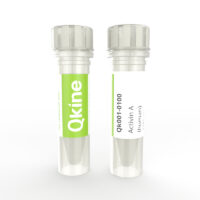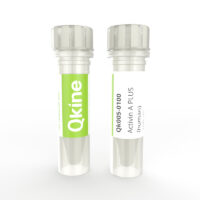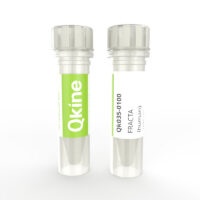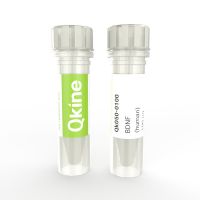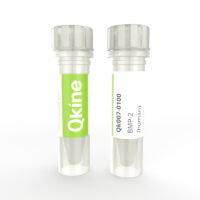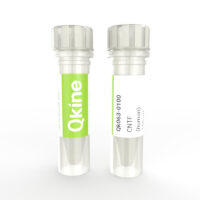- Activin A is a TGF-β family growth factor regulating embryonic development, cell proliferation, differentiation, and immune responses. Activin A is frequently used to maintain pluripotency in induced pluripotent and embryonic stem cell cultures. It is also used in many stem cell differentiation protocols, including endoderm lineage differentiation and further maturation into hepatocyte and pancreatic cells. Recombinant human/mouse/rat/bovine/porcine activin A protein is a high-purity mature bioactive dimer of 26 kDa. It is animal-free, carrier protein-free, and tag-free to ensure its purity with exceptional lot-to-lot consistency. This protein has been rigorously benchmarked against other commercial sources and extensively validated for highly reproducible stem cell culture. Qkine founder Marko Hyvönen developed the protocol for making high-purity activin A, and this protein is used at the Cambridge Stem Cell Institute. High purity mature bioactive dimer. Animal-free (AOF) and carrier-protein free (CF). Rigorously benchmarked against other commercial sources.
- Human/mouse/rat Activin A PLUS ™ protein is an optimised biologically active truncation of the mature domain of human Activin A protein. The EC50 and activity in stem cell culture of activin A PLUS is equivalent to the full mature domain activin A.High purity 24 kDa dimer comprising truncated mature domain of activin A protein, animal-free (AF) and carrier-protein free (CF). Recombinant Activin A PLUS is designed to be manufactured at scale for cost-effective, large-scale stem cell culture applications.
- Follistatin-resistant activin A protein (FRACTA) has been engineered to prevent binding to the natural inhibitor, follistatin. Activin A activity protein is regulated in vivo by follistatin, a high-affinity inhibitor; follistatin accumulates in stem cell culture, where it inhibits activin A.Qk035 follistatin-resistant activin A protein (FRACTA) has equivalent bioactivity to wild-type activin A (Qk001) but does not bind follistatin so is resistant to feedback inhibition. High purity 26 kDa dimer comprising engineered mature domain of activin A protein, animal-free (AF) and carrier-protein free (CF). This specialised activin A has been developed in Marko Hyvönen’s group in the University of Cambridge.
- Brain-derived neurotrophic factor (BDNF) is a member of neurotrophin family and plays a crucial role in neural development, maintenance, and function. It stimulates neurogenesis and is also a major regulator of synaptic plasticity and neuroprotection. It is used to maintain neurons and differentiate and mature human pluripotent stem cell-derived neural progenitors to cortical and motor neurons and cortical organoids.Recombinant human BDNF protein has a molecular weight of 14 kDa. This protein is animal-free, carrier-free, tag-free, and non-glycosylated to ensure its purity with exceptional lot-to-lot consistency. Qk050 is suitable for the culture of reproducible and high-quality cortical and motor neurons and cortical organoids.
- Human/mouse/rat/bovine/porcine BMP-2 protein (bone morphogenetic protein 2) protein is member of the TGFβ family and a key regulator of embryogenesis and potent differentiation factor of embryonic stem cells (ESC) and induced pluripotent stem cells (iPSC) towards endoderm fates. BMP-2 plays roles in the differentiation of mesenchymal cells to adipocytes, epithelial cancer EMT, chondrogenesis and regulation of neuronal and glial cell development.26 kDa disulfide–linked bioactive highly pure dimer comprised of the mature domain of human BMP-2 protein. Animal-free (AOF) and carrier protein-free.
- Ciliary Neurotrophic Factor (CNTF) is a member of the IL-6 family of cytokines. CNTF plays a crucial role in developing and maintaining the nervous system, in particular the optic nervous system. It promotes the maintenance, differentiation, and survival of various neurons, glial cells, and retinal cells.CNTF has been used in vitro to initiate neural induction and differentiation. CNTF can be used to culture primary neurons and glial cells such as astrocytes and Schwann cells. It is also used to culture retinal cells and adipocytes.Human CNTF has a molecular weight of 22.8 kDa. This protein is carrier-free, tag-free, and non-glycosylated to ensure its purity with exceptional lot-to-lot consistency. Qk063 is suitable for the culture of reproducible and high-quality neurons and other relevant cells.
